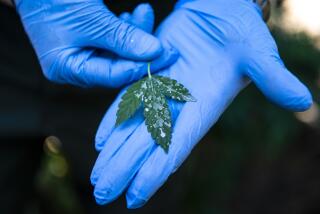Banning weed is bad medicine
Those searching for answers to the question “Is medical marijuana good medicine?” will find few in Dr. David Sack’s Times Op-Ed article.
On the one hand, Sack concedes, “Marijuana can effectively treat neuropathic pain, and it has been shown to improve appetite and reduce nausea,” an acknowledgment substantiating the plant’s therapeutic utility. However, he later warns that cannabis’ ability to provide relief for certain other conditions, such as lupus and anxiety, remains unproven. So what? Are we to believe that because marijuana may not work as a medicine for everyone that this somehow negates the reality that it is a safe and effective agent for those people suffering from conditions for which it has been proven to help? Imagine if we were to judge other medications by this same, unrealistic standard.
Further examples of Sack’s schizophrenic attitude on cannabis are abundant throughout his commentary. He feigns outrage that some individuals may be violating the spirit of California’s medicinal cannabis law simply “to get high.” Yet he fails to persuasively argue why he believes this behavior is problematic, admitting, “Those who get a card and indulge in the infrequent use of marijuana will probably experience few problems.”
VIDEO: L.A. City Council votes to ban pot shops
Sack does express some concerns about those who consume cannabis chronically, though statistically, most of the estimated 100 million Americans who have experimented with pot do not fall into this category or use it problematically. He also warns that marijuana use may in some instances exacerbate certain psychiatric disorders. Yet on this matter the available data remain inconclusive at best. Notably, several recent studies indicate that cannabis probably plays little or no role in the precipitation of disorders such as schizophrenia, while others indicate that marijuana may be helpful in patients with depression or suicidal thoughts.
This is not to say that marijuana is without risk. It most certainly isn’t. However, concerns regarding cannabis’ relatively minor risk potential are hardly persuasive arguments for maintaining its illegality. As Sack admits, there are numerous adverse health consequences associated with alcohol, tobacco and prescription pharmaceuticals -- all of which are far more dangerous and costlier to society than cannabis -- and it’s precisely because of these consequences that these products are legally regulated and why their use is restricted to particular consumers and specific settings. A pragmatic regulatory framework that allows for the limited, licensed production and sale of cannabis to adults, but continues to restrict consumption among young people, would best reduce any risks associated with its use or abuse.
Likewise, regulation would also positively address those risk factors largely associated with the substance’s criminal prohibition rather than the plant itself. For example, as noted by Sack, the marijuana sold on the streets and even within some California dispensaries is often of unknown purity and quality. Further, street dealers who engage in marijuana sales are typically criminal entrepreneurs who may also introduce consumers to other, more potent illicit substances. Finally, the black-market inflated price of cannabis exposes its producers and consumers to potential crime and theft from other criminal entities looking to exploit the drug’s prohibition-inflated economic value. Each of these potential risks would be mitigated, if not eliminated, under a system of cannabis legalization and regulation.
As for Sack’s initial question, “Is marijuana good medicine?,” like any medicine, the answer will depend on the patient and the circumstances. Cannabis is no doubt therapeutic for some but not necessarily appropriate for everyone. Can cannabis be abused? In some limited instances, yes. Nonetheless, the overwhelming majority of consumers use it responsibly and in moderation. Isn’t it about time our laws and public policies reflected this reality?
ALSO:
Letters: Chick-fil-A vs. Boston
Is medical marijuana good medicine?
Should the media not use James Holmes’ name?
Paul Armentano is the Deputy Director for NORML, the National Organization for the Reform of Marijuana Laws, and is the coauthor of the book, “Marijuana Is Safer: So Why Are We Driving People to Drink?”
If you would like to write a full-length response to a recent Times article, editorial or Op-Ed and would like to participate in Blowback, here are our FAQs and submission policy
More to Read
A cure for the common opinion
Get thought-provoking perspectives with our weekly newsletter.
You may occasionally receive promotional content from the Los Angeles Times.










